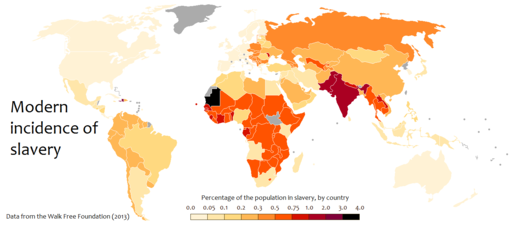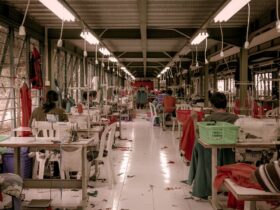“I dedicate this award to all the people who have endured slavery and the 21 million people who still suffer slavery today.”– Director Steve McQueen, on accepting the Oscar for 12 Years a Slave.

The word slavery often evokes, among other things, historical images of the East India Company, the transatlantic slave trade, and Southern plantations. Unbeknownst to many, slavery has experienced a resurgence in the last half century. Today, it is estimated that anywhere from 21 to 30 million people around the world are slaves. People forced into prostitution or uncompensated labor, children forced into marriages and war, and victims of human trafficking all qualify as modern slaves. Moreover, not only does slavery exist in today’s society, it is also a thriving industry. In fact, there are more slaves today than at any other time in human history.
Developed nations typically experience a low rate of slavery due to a number of circumstances including national wealth and political stability. Factors such as enforced rule of law and low rates of corruption can ensure harsher penalties for perpetrators and reliable protection for victims. Stable, developed nations, like the United States, Canada, and Australia, all have low rates of slavery (i.e., below 0.05% of the population). Although comparatively low, this rate is nevertheless significant and embarrassing.

McQueen is an advocate for Anti-Slavery International, one of the many organizations dedicated to combating slavery with the implementation of an unorthodox approach. Since slavery is strongly associated with poor economic development, organizations like Anti-Slavery International are using “Fairtrade” to help eradicate slavery by creating stable incomes and improved working conditions for farmers and their families. Fairtrade employs cooperatives and independent small farmers, and thus, unlike foreign development aid, seeks to establish self-sufficient communities. Further, Fairtrade is a market-based strategy that encourages sustainability by elevating trading standards. World commodity prices tend to be volatile and in response, the Fairtrade minimum price was established to ensure that farmers are paid for the cost of their sustainable product, regardless of market prices. Consumers pay a higher premium on products, which allows money to flow into impoverished places. The producers of these goods are able to earn a fair wage and support themselves through their work.
Fairtrade helps to develop higher social and economic standards in places that and for people who need it most. It is the hope that these people will be given the opportunity to provide for themselves and avoid exploitation. Buying goods through Fairtrade will halt the cash flow to companies that maintain low production costs with the use of slave labor. Although the problem of modern slavery is a deeply complex issue, one can only hope that Fairtrade will be a factor that contributes to its eradication.
The views expressed by the author do not necessarily reflect those of the Glimpse from the Globe staff and editorial board.







